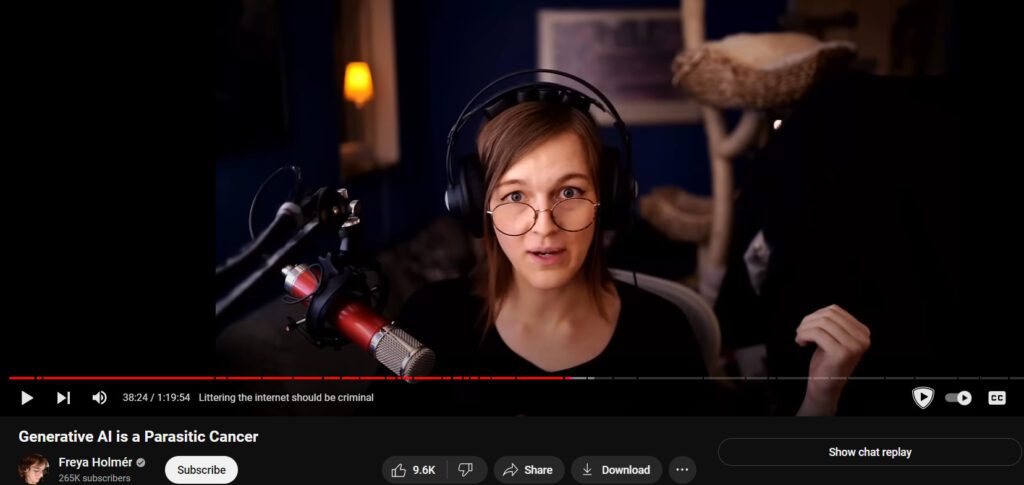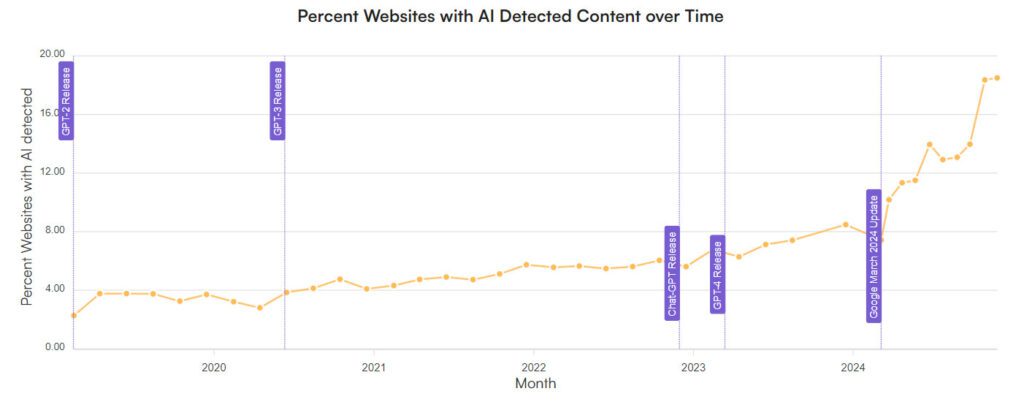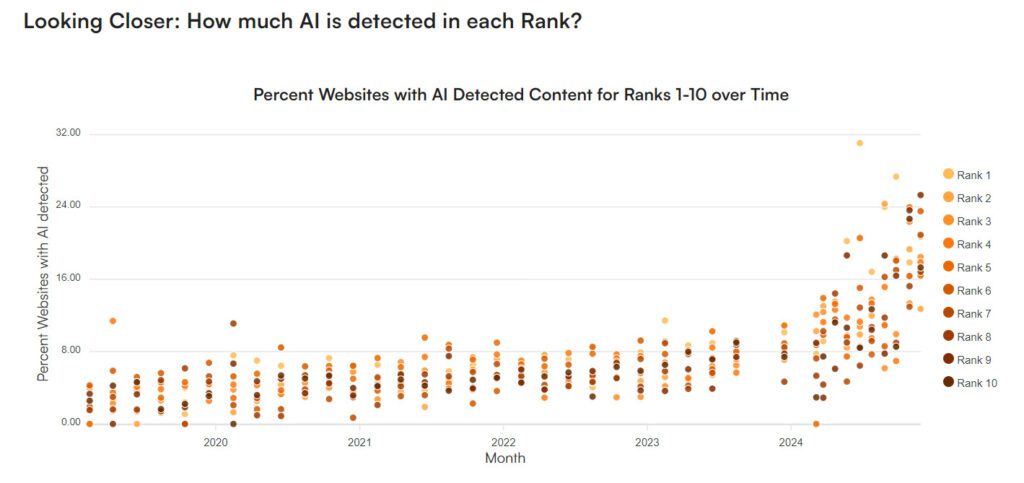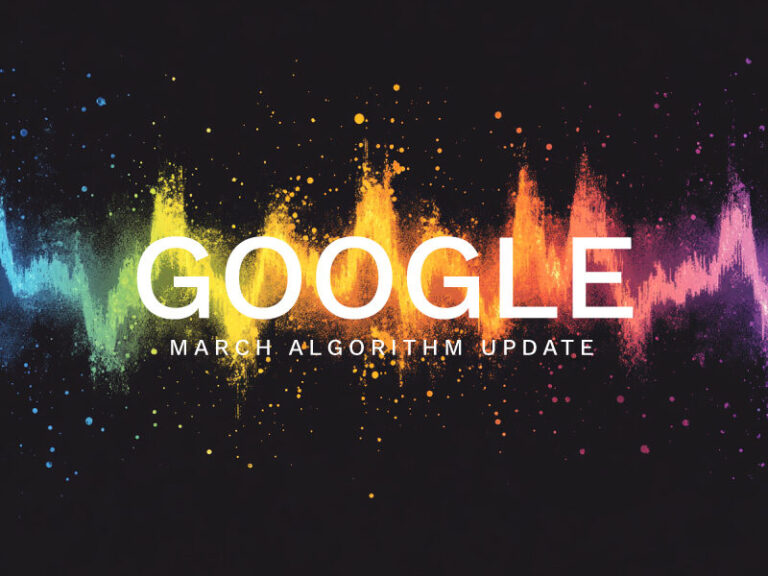While working, I habitually listen to an audiobook or watch YouTube videos about technology and what’s in the marketing field. I also listen to Steven’s Diary of a CEO on YouTube.
This article is not about any of this, but a video was shown to me on my YouTube feed today. This raises a valid point about what we have noticed for a while now regarding low-quality prompts creating low-quality content on the web, which Search Generative Engines pick and source for their content.
Can we really find information that is helpful on Google today?
The short answer is yes, but here me out.
Writing AI articles is easy.
We all use it to some extent, but the overwhelming majority automate it to an extent where every round of content being pushed out is a remix of existing AI-generated Content. It’s like the previous low-quality content had a baby with a load of filler content. Most of the time, you don’t really find anything new other than on Reddit.
Here is a screenshot of the person who inspired me to write about this concern, which I had noticed for a while. I found it hard to get a good screenshot of her with direct eye contact with the camera, though a few freezing frames did get the job done, and I just wanted to give credit where it’s due.

When AI came through, most of the major newspaper publishers saw what was coming, but if I said it was overlooked, I should be correct.
The Case
Google’s search results have increasingly featured AI-generated content, mainly from external sources.
This shift has raised concerns about the quality and reliability of the information presented to users who are used to searching for decades. This is the main audience of Google and other search engines.
People have been talking about this for a while, but it might be too late for Google to put the cat back in the bag at the rate the low-quality content is flooding the web.
Even Forbes, Search Engine Journal, and The Verge have written about this.
Forbes article discusses how Search engines like Google prioritize high-quality content, whether it’s created by humans or AI, but the truth is far from it.
Google has guidelines that content should be helpful and created for people, not to manipulate search rankings, but from the video linked above, over 80% of the content was AI-generated, maybe with spelling mistakes done on purpose to game the algorithms, which they are successful.
We know AI content that is designed to manipulate search rankings is against Google’s spam policies.
Google says they can detect and penalize AI content that is published to manipulate search engine rankings.
However, the amount of AI content in the top search results has been increasing even though it has some use for a general user; when you try to get information that you can act based on a specific subject, Wikipedia and Reddit have become the authoritative platform.
Not that you can’t manipulate both, but moderators quickly pick up on them most of the time.
I’m not admitting to anything, but you can still do it if you want to, just like how people manipulate AI-generated content, especially articles to have mistakes in them, so when they run it through an AI detector, it gives you a standing ovation for being human and successfully misleading it.
Google has been offering the throne to number 1 search engine ranking to websites that have a backlink from a website like Wikipedia since I started learning all this back in 2013.
I have heard of a website built back in 2013 and got a backlink from Wikipedia, and that website is still in the number 1 position for that highly competitive search term even though this website has not been updated since 2014, even the framework that website was built on was discontinued but the website is still dominating.
Getting back to the AI takeover through the Search Generative Experience by Google.
Could declining content quality be a significant factor in user frustration?
Update (15th Jan 2024)
The breach of the 90% market share barrier in late 2024 might signal a quiet revolution in how people seek information. Knowing that it’s after a decade of dominance.
The rise of AI search tools could offer a compelling explanation for Google’s recent market share dip.
This parallels the restaurant industry! Declining quality drives diners to explore new options.
As Google’s search results become increasingly cluttered with SEO-optimized but low-value content, users seem to be actively seeking alternatives like searching everything on AI Tools like ChatGPT, Claude, and DeepSeek.
Even though this is not directly reflected in current market share data, these tools represent a growing awareness of alternative search methods.
When people can get quick, clear answers from AI tools, they don’t want to spend time scrolling through lots of Google search results that might not help them.
That’s why Google and other search engines are now adding AI-powered answers directly to their search results; they want to keep users from going elsewhere.
Why AI-Generated Content Lacks Depth and Accuracy?
A notable critique comes from Freya Holmér, who discussed this issue in detail on her YouTube channel.
Holmér points out that AI-generated content often lacks depth and accuracy.
The automated articles she goes through in her video are typically produced to rank highly in search results, prioritizing search engine optimization (SEO) over genuine value to readers.
This practice leads to a proliferation of low-quality information that can mislead users seeking reliable data.
I like to believe that Google will gradually roll out a mechanism to clean their search results because a prominent part of their income generation comes from Google Ads, and more people talk about this low-quality content issue and the more people search on Perplexity, Claude, ChatGPT and Gemini, who will see the ads.
What is the Reality of AI-generated content in Search Results?
Supporting the above observation, a study by Originality.ai found that as of November 2024, approximately 18.5% (which grew from 13.95% in June 2024) of content in Google’s top search results was AI-generated, up from 7.12% in June 2023.
This significant increase suggests a growing reliance on AI for content creation, which may contribute to spreading subpar information.

Google has acknowledged the challenges posed by AI-generated content.
In March 2024, the company reported that its search results were being inundated with websites that “feel like they were created for search engines instead of people.”
A Google spokesperson noted the role of generative AI in this rapid proliferation and its potential to displace more valuable human-made content.
We even use AI to generate content, which we then further optimize with our experience, case studies and expertise to give the reader value.

What are Google’s Measures to Prioritize High-Quality Content?
All the SEO experts are talking about EEAT these days, what is E-E-A-T really?
To address the issues of AI-generated subpar content, Google has implemented measures to prioritize high-quality, human-authored content.
E-E-A-T stands for Expertise, Experience, Authoritativeness, and Trustworthiness.
It’s a concept created by Google to evaluate the quality of information on the web.
Google’s Quality Raters use these guidelines to assess search results and ensure that they are high-quality, relevant, and trustworthy.

By focusing on these criteria, Google aims to reduce the prominence of low-quality AI-generated material in search results.
While E-E-A-T isn’t a direct ranking factor, it’s important to consider when creating content.
You can increase your chances of ranking higher in search results and establishing yourself as a credible source of information, but how you will make it to the ranks against all the AI-generated content is a topic of debate.
Debate Over Effectiveness of Google’s Measures
We know that it’s only a matter of time for people to figure out ways around this for quick responses to rankings.
Given that the effectiveness of these measures remains a topic of debate.
Critics argue that as AI technology continues to evolve, distinguishing between human and AI-generated content becomes increasingly difficult where the LLM to models like stable defusion and sora are built and improved to mimic an actual human.
This blurring of lines poses a challenge for both search engines and users in ensuring the accuracy and reliability of online information.
In Conclusion
So many are expressing their frustrations about this issue.
The rise of AI-generated content in Google Search presents a significant challenge in disseminating high-quality, trustworthy information.
While Google has implemented measures to combat low-quality AI content, the rapid evolution of AI technologies necessitates continuous adaptation and refinement of search algorithms.
Integrating AI into our lives is inevitable, and it will undoubtedly reshape the job market.
For someone who might be risking a possible job loss due to AI advancement and AI agents, cultivating creativity and critical thinking skills with being a jack of all trades or learning another field in addition to your core skillset will be a crucial strategy for individuals to thrive.
We anticipate a future where websites that leverage AI responsibly to enhance human creativity and deliver valuable, authentic content will be rewarded in search rankings.
As search engines themselves continue to evolve, it’s crucial to prioritize quality and user experience in all aspects of online content creation.
As I have shared my personal experience with a high-quality backlink, which gave an outdated website an edge in SERPs, this will definitely be something similar where more people use AI to accelerate operations; this will have its own challenges and a unique edge in the future.
We encourage you to watch the video linked at the beginning of this article for a deeper dive into this topic with Freya Holmér opinion proven with a live preview of a SERP.
Remember to revisit this page regularly as we continually update our content to reflect the latest developments in this dynamic field.









